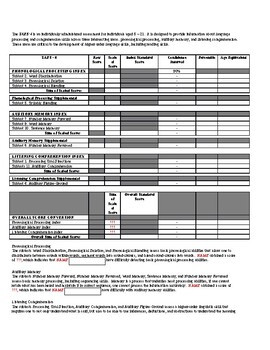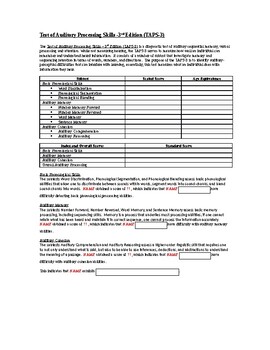

Inefficient central hearing can adversely affect all aspects of language development, including acquisition of age-appropriate vocabulary, morphology, syntax, semantics, and/or a second verbal language. Thus, secondary deficits in phonologic processing, reading decoding and comprehension, and spelling are common. A student who does not "hear" the sounds of speech efficiently will struggle to attach meaning to those sounds. Substantial research has indicated that a deficit in any of the central auditory processes can co-exist with or be a significant contributing factor to other functional deficits, including learning disabilities, speech-language impairment, attention deficit, or developmental disabilities (Bellis, 2003 Burns, 2013 Ferre & Wilber, 1986 Geffner, 2007 Jerger, Martin, & Jerger, 1987 Tillery, Katz, & Keller, 2000).ĭeficits in auditory discrimination are the result of inefficient extraction of the fine acoustic cues in the speech signal. The central auditory processes identified to date broadly fall into one of three types: auditory discrimination, binaural processing, and temporal processing. This interprofessional team is able to clarify the nature of the listener's functional impairment and develop deficit-specific intervention plans to reduce or resolve the auditory impairment, improve affected communicative and academic skill sets, and minimize the impact of the processing disorder on the student's life.Ĭentral auditory processing disorders (CAPDs) are breakdowns in the acoustic components of the processing continuum, specifically deficiencies in the brain's ability to use auditory information sent to it from the peripheral auditory system (i.e., outer, inner, middle ears and the auditory nerve). Audiologists diagnose central auditory processing deficits by using assessment tools designed to maximize the load on the auditory system while minimizing the influence of other neurocognitive skills (e.g., attention, receptive language). Psychologists, educational specialists, and other professionals obtain information regarding a client's academic achievement and everyday listening skills. Speech-language pathologists use formal and informal tools to examine phonologic, linguistic, and executive aspects along the continuum. Because breakdowns along the processing continuum adversely affect academics and/or communication, audiologists and speech-language pathologists play important roles in the implementation of the Core, assisting both students and teachers in meeting these goals. The Core, as it has come to be known, currently includes standards for math and English language arts, with the latter including reading, writing, speaking, listening, and language usage (National Governors Association Center for Best Practices, Council of Chief State School Officers, 2010). The Common Core State Standards, now adopted by 44 states, represent learning goals for students in grades K–12 designed to ensure that students graduating from high school are prepared to begin post-secondary education and/or to enter the workforce. Audiologists and speech-language pathologists work together to assess deficit areas, describe impact, and provide intervention. Breakdowns along this continuum can affect a listener at school, in the home, and in social communication situations. This peripheral-to-central continuum consists of acoustic and related phonologic, linguistic, and cognitive-communicative skills that enable us to communicate successfully, achieve academically, and maintain our sense of self. There are things that you and other people can do to help with your or your child's auditory processing disorder (APD).Auditory processing is a true process that begins at the ear and ends when we execute a response. Things you can do to help with auditory processing disorder (APD)

To reduce background noise, schoolchildren with APD may be advised to wear a wireless earpiece that connects to a tiny microphone worn by their teacher.

You can do it with a hearing specialist or in your own time online. Treatment usually involves activities to improve listening and concentration. There's no cure for auditory processing disorder (APD) but there are things that can help. Treating auditory processing disorder (APD)

Testing for APD is not usually done on children under 7 years old. memory, problem-solving and concentration tests.having electrodes on your head to measure how your brain reacts to sound.To test for auditory processing disorder (APD) you or your child may be asked to: Tests for auditory processing disorder (APD) The GP may refer you to a hearing specialist. you or your child find it hard to hear or understand speech.


 0 kommentar(er)
0 kommentar(er)
